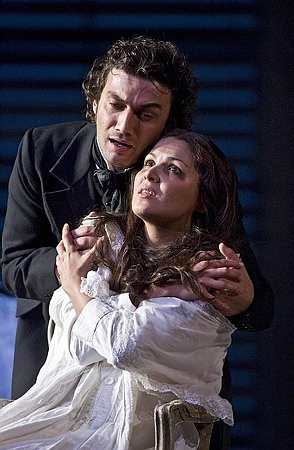|
|
|
|
|
|
|
|
| The Independent, 16 January 2008 |
| by Edward Seckerson |
Verdi: La traviata, Royal Opera House, 14 January 2008
|
La Traviata, Royal Opera House, London
|
| A stellar Violetta steals the
show |
|
 The five stars belong to Anna Netrebko. Just
when you thought that no one could put the dramatic imperative back into
Richard Eyre's impassive staging, along she comes with her fabulous
technique and volatile temperament to remind us (as if we needed reminding)
that stars are born, not made. The five stars belong to Anna Netrebko. Just
when you thought that no one could put the dramatic imperative back into
Richard Eyre's impassive staging, along she comes with her fabulous
technique and volatile temperament to remind us (as if we needed reminding)
that stars are born, not made.
This Violetta does not go quietly into that long, dark night. With a
consumptive cough every bit as alarming as the fearsome challenges of
Verdi's emotive coloratura, her instinctive response is to reach for another
glass of vintage champagne. At least, in Act I it is. By Act III, love and
humility have made her someone else. And it's the journey there that makes
this "fallen woman" special. Netrebko is, in a word, sensational.
We first see her picked out of the darkness, as Verdi's ethereal prelude
hazily reflects on her destiny with its premonition of music from the final
act. This is the private Violetta – lonely, and alone. But then the lights
come up, the party crowd gathers, and she's "on". There is a discernible
switch: suddenly Netrebko is vivaciously spinning from one guest to the
next, all things to everyone. And then Alfredo arrives in the alluring
form of Jonas Kaufmann – and it is clear that this isn't about to be a
one-woman show.
In this crucial opening party scene, both these exceptional artists boldly
put aside operatic pretence and play their electric first encounter for
real. Naturalism is a dangerous game in the cumbersomely high-flown world of
opera – but then, so is the nature of their liaison.
So how do they do it? By freezing the moment where their eyes first meet and
romancing each other in phrasing that is at once fresh and intimately
inflected. Both make seductive, elegant turns in the drinking song; neither
sings it as you expect it to be sung – or usually hear it sung. Kaufmann's
singing is so relaxed, it's almost horizontal.
But then Violetta is alone again and Netrebko is in business. I don't think
I've ever seen the thought processes of this demanding scene, "Ah, fors'e
lui", so clearly, so grippingly, conveyed. This is "the method" applied to
singing. Where most Violettas are busy contemplating the next tricky
roulade, Netrebko is lost in the intoxication of the moment. First, she's
using the coloratura flippantly, blithely disbelieving that he might be "the
one". Then, like an echo of his palpitating heartbeat, she recalls the music
of Alfredo's confession of love, finding breathless in-the-moment shadings
for words like "mysterious" and "exalted". On then to the delirious
cabaletta – "Sempre libera" – dismissing the notion that she must be forever
free by convincing us that she doesn't for a moment believe it. And that,
predictably, brings the house down.
Of course, none of this is possible if you don't have the technique to pull
it off. Netrebko's strength is not just in the mobility of her voice and the
razzle-dazzle of her upper register's big-money notes – no, it's the
fullness and beauty of the middle voice that singles her out and makes key
moments like the emotional outburst in Act II – "Amami, Alfredo" ("Love me,
Alfredo") – properly overwhelming. For once, fullness of heart is truly
matched in fullness of sound.
But that moment only works because of what comes before it – and the third
member of the "dream team" first cast for this revival is Dmitri
Hvorostovsky. His physical reserve on stage is harnessed to good effect
here, as the father who cannot see beyond Violetta's reputation to the woman
his son truly loves. The role centres on the nobility of sustained legato
singing, which is Hvorostovsky's speciality.
In the pit is a true Italian, Maurizio Benini, who fully understands the
rhythmic impulse that drives this score. But the evening belongs to Netrebko
– and if you didn't know the ending of the opera you might believe in
miracles, as the pain ceases and she momentarily rises from her deathbed to
rejoice in the knowledge that love conquers all. Especially the Covent
Garden audience.
|
|
|
|
|
|
|
|
|
|
|
|
|
|
|
|
|
|
|